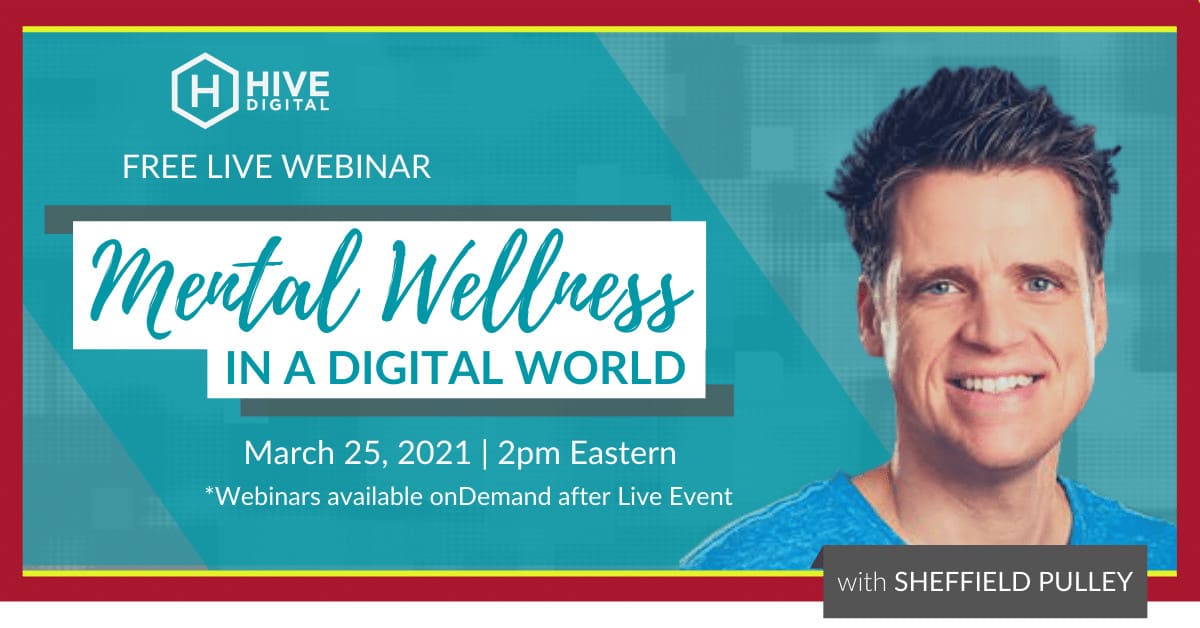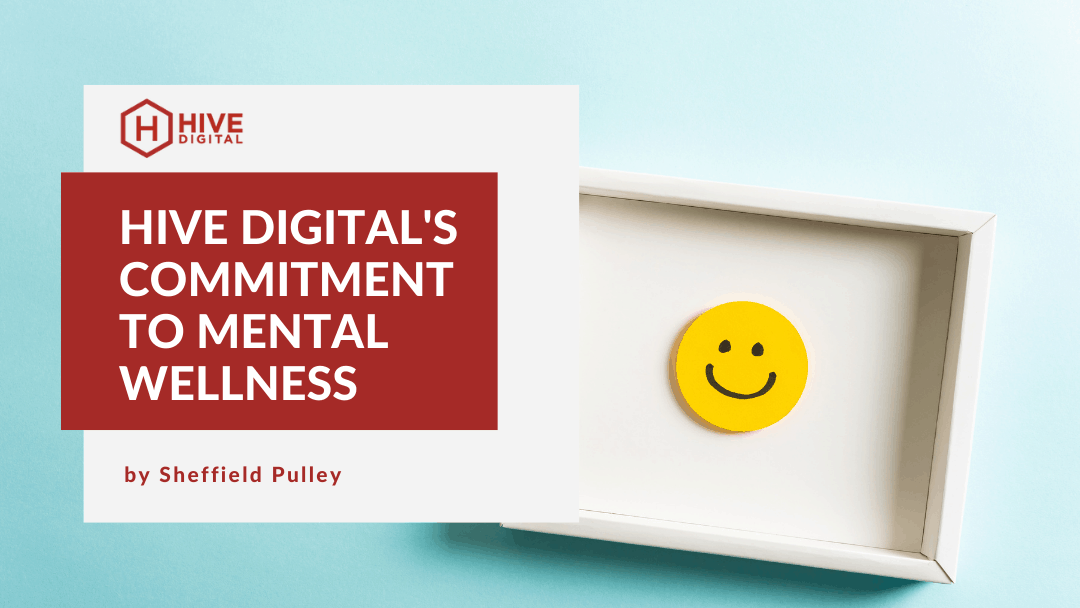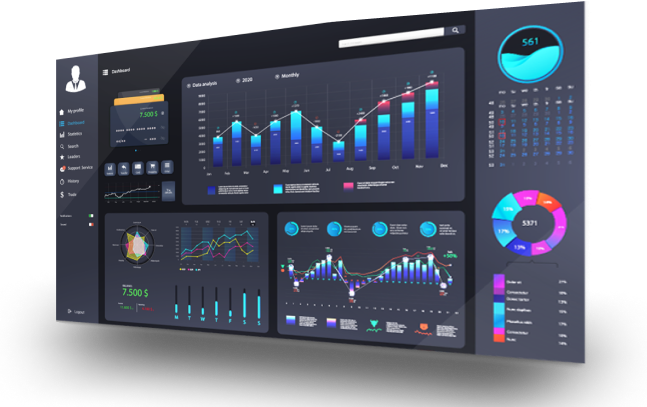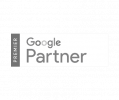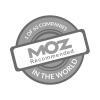The recent tragedies involving SEOs has sparked some much needed discussion on the importance of honest communication, community, and ways we can be more healthy both physically and mentally. I’m especially grateful to Jenny Halasz for her openness in these discussions and leading the #seochat Thursday. Unfortunately, I missed #seochat as I was at lunch with a colleague… though we were there in thought as we shared our own discussions on the topic. I originally started to write this as a comment response on the SEORoundTable post on the chat, but quickly realized I had too much to say for a single comment.
I was hesitant to share on our company blog vs. my personal (and unkempt!) site, but felt that since a strong element of the Hive ethos is about being happy, healthy, and fully alive, that this conversation could be appropriate to share here.
These are some of the work related things that consistently keep me up at night, and I’ve had to work diligently for years with my team, my family, and friends in order to keep from feeling overwhelmed. I’ll try to share some of the ways I’ve tried to cope with these things, and would love to hear any/all feedback/suggestions.
- Being #1 (or “winning”) is never good enough. Even when we are successful, there is little time to celebrate, as we are typically chasing down the elusive desires of businesses that want never-ending growth. You don’t really get a chance to stand atop the summit of your mountain, take in what you’ve accomplished, and simply breath. Combating this is difficult, as clients certainly don’t want you to seem complacent and suggesting that you should get a week vacation from their account now that we have a #1 spot we’ve been targeting for months will only be met with disappointment. I don’t have a solution for this and struggle with it regularly… would love feedback and advice here.
- Being #1 (or “winning”) brings more stress. With success comes greater risk in loss of rankings and more bitter competition as you become “the target” for everyone in your space. As SEOs, we know that our success often means food on someone’s table. Whether that is a client’s employee that gets laid off if they don’t meet $ quotas, the client company that fails if you can’t “save” them, or your own family if you lose the contract. I’d like to think I’ve gotten better at dealing with this, but I’m not sure in moments if I’m kidding myself or if time and experience has just been desensitizing. I’ve resolved that I can only do my best, and that I should probably charge more if I’m going to continue to wear this to bed.
- Constant uncertainty. Even when you are being “lily white” with your strategy, there is always the unknown of how the next algorithm update could impact your clients. Even worse, there is a constant unknown of when an algorithm update could be released. It’s like wagering your career on penny stocks all day, never knowing if something is going to go big or bust. When penguins were in full force, our whole company wore this closely. We were watching business fail because they hired fly-by-nights or took some bad advice from an old forum posting telling them Xrumer is their silver bullet.As an agency we were seeing demand for some SEO services tank as the FUD campaigns ran rampant, and I brought this stress home to my family daily. Even now, I often start my day wondering what fire I will have to put out because Google made a subtle change… like when they introduced a product carousel powered by adwords that dropped a client’s organic traffic 25% despite maintaining their top rankings.
I’m not sure how I navigate this one other than accepting the uncertainty as a fact of life for SEO and being comfortable in that space, also knowing that navigating this uncertainty is what partially drives the demand for real talent in our industry. The stress is definitely real, but this is what creates the demand for experienced SEOs. For a new SEO, or someone who struggles with uncertainty, I can definitely see where this could “break” a person.
- Education. When we aren’t stressing about clients rankings, we are (hopefully!) focusing our time on educating ourselves. Our industry continues to become more segmented as strategies take on a life of their own and suddenly SEO for news sites, local SEO, image SEO, ecom, enterprise ecom, b2b, b2c, social content, whitepaper content, etc.. all become their own individual career path. When I started in SEO, you were expected to know how SEO intertwined throughout the business and help companies navigate best practices. Now, each of these segments independently require constant experimenting, reading, etc. to stay on top of best practices, and I’m unaware of many agencies that have a person dedicated to distilling the days news into relevant action insights for the agency.
I know this is one of the many roles that Mark Traphagen has seemed to have taken with Stone Temple, and as a small agency, our scrappy team has to consume all of the days info with our limited time and rely on each other to divide and conquer. I’ve been digging Sparktoro for its ability to quickly surface some of the most important news of the day, and I’m hopeful the platform can further our ability to basically crowdsource what deserves a deep dive and inspire more creative solutions for this problem.
- Constant judgement. We work in an industry where everyone is going to pick apart every letter in a John Mueller (or often anyone else) tweet and try to debunk/discredit them with an edge case example. I’m not saying we shouldn’t “peer review”, but that our methods of communicating ideas and discussion often lead to criticism that is not constructive, or is intimidating for those that fear being disparaged or losing credibility should they ask a “stupid” question.
I’ve been fortune enough to have a group of colleagues that I’m comfortable being stupid around. If I make a mistake, they call me on it, but it seems to be a judgement free zone with the sole purpose of helping each other succeed. This is the part of our community that has to flourish and be obvious in order for others to feel safe sharing their fears, concerns, questions, and insecurities around the advice they give to clients. If we make people feel like they can only come across as experts, we’ll all stay hidden behind our masks.
- No time off. Due to all of the items above, there really is no “break” from work. Taking a day off generally means pushing work forward for another day, or it means missing a day of industry change that could impact everything you are doing (rendering any sort of “auto-pilot” as a risk). While away from work, you think about what you may be missing, what may be happening, or what research or knowledge bomb will get dropped by someone that could make the difference for your client … if only you don’t miss it!
This inability to fully disconnect is taxing on physical and mental health.The closest I’ve come to addressing this is in my search for quality family time. Even in the simple things such as ditching phones during mealtime or “losing my phone on Saturday”. There are fleeting moments where I can completely forget the rest of the world exists, but they are fleeting and in most cases, I often “daze” into work related concerns, or questions. I’ve also found some short windows of becoming “clear” through meditation practices, but unfortunately, I haven’t found the discipline to do this, and often let the burden of deadlines prevent me from making the time to sit and “do nothing” for an hour (stupid excuse, but its reality).
All these issues aside, I love my job. I revel in the challenges of being an SEO, I’m inspired by the brilliance that surrounds me and pushes me to be better and learn more. I find immense satisfaction in finding wins for clients, “saving” their businesses, helping them provide for their families and those of their staff. I’m in love with the sudoku meets crossword meets rubiks cube puzzle`esque problem solving inherent in SEO. I love the fact that I constantly face and overcome challenges I’ve never seen before. I love the fact that I get to see the inter-workings of business strategies from a most diverse set of companies across the globe. I love the fact that everyday will be an unknown journey that I must embark with only the tools/skills that I have available, and that I must creatively innovate to succeed. Most recently, and most important I think, I’m loving the companies and teams that I get to work with on a daily basis.
As an agency, I think our team has done a much better job at vetting out better clients. We’ve made a point to pivot our company to create a simple litmus test for client selection… “Would I be proud to tell my kids that I work for this person?” There are always going to be those clients that expect you to slave on their behalf, but our client mix now is generally very human in their expectations of our teams. I received a text from a client last week reprimanding me for responding to an email while I was at Disney World with the family… I’ve never been so fulfilled in being scolded. I think client selection is probably the single most important change our agency has made in helping us overcome some of the obstacles I outlined above.
When I started to write this, I looked for suicide rates by industry, as I wanted to see if marketing was categorized (doesn’t appear to be). Seeing “management” and “sales” categories ranking quite high definitely rang a bell
Of note, while management occupations had the 10th highest rate of suicide, they accounted for the second largest percentage of suicide deaths overall; therefore, it is important to target prevention strategies to managers as well.
Additionally, the Bureau of Labor Statistics reportedly interviews within each category to report a metric for “stress”, but I couldn’t find it for the marketing category. As SEOs, we typically wear a large number of hats, especially if we are small teams or solo entrepreneurs, ranging from sales, management, IT, crisis counselors, etc. This presents a unique set of challenges and creates a very dynamic level of stress for the modern SEO. To combat and overcome these challenges, we have to move past questioning how we didn’t recognize these things in others, but focus on recognizing them within ourselves, and sharing those truths, so others can see it is okay to have an open and vulnerable discussion… and most importantly, that we are not alone in our struggles but just as together in solving these problems as we are in our attempts to deconstruct the worlds most influential algorithm.
JUMP TO A CATEGORY
WEB ANALYTICS | SEARCH OPTIMIZATION | PAID ADVERTISING | COMPANY NEWS


